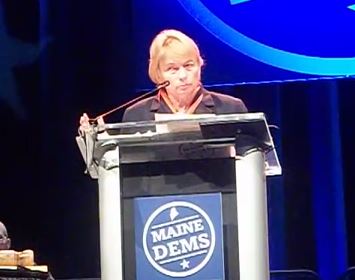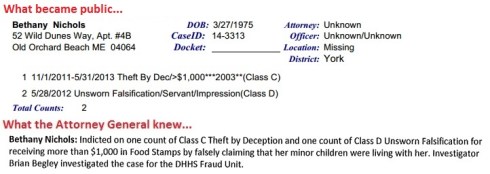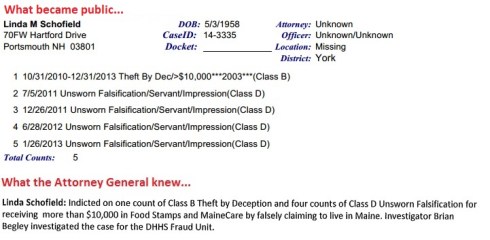
Maine Attorney General Janet Mills makes no attempt to conceal her contempt for Republican Gov. Paul R. LePage or her wish to see him defeated this November.
Emails obtained by The Maine Wire show just how far the state’s top attorney is willing to go to advance her anti-LePage agenda — even if it means overruling her own assistant attorney general or withholding information about welfare fraud from the media.
A STRIDENT PARTISAN
Elected to the Maine House of Representatives in 2002, Mills, 66, served until a Democratic Majority in the Legislature tapped her to become Maine’s first female AG in 2008. She briefly left office when the Republican-controlled 125th Legislature swept into power, but quickly returned in 2012 when Democrats took back control.
Since resuming office, Mills has repeatedly butted heads with the LePage administration on a variety legal and political issues. In January, Mills accused LePage of violating Maine’s public records law for refusing to release early draft copies of the controversial Alexander Group report. LePage’s response: “She can sue me.”
Last month, Mills proved LePage is not the only Maine political figure capable of making outrageous statements; she had the crowd at the Maine Democrats’ state convention roaring with mean-spirited comments about the governor.
“This year, our recycling starts right at the Blaine House,” said Mills, before blasting LePage for “eschewing governing” only to “head to Jamaica to play golf.”
Mills accused the LePage administration of using the Department of Health and Human Services for “electioneering” and even made a disturbing wisecrack about LePage’s alleged views on abortion and his 17 brothers, sisters and half-siblings.
“I heard Paul LePage say he’s dead set against abortion because he’s one of 18 children after all,” said Mills, evoking laughter from Democrats by potentially implying that LePage or one of his siblings ought to have been aborted. (See 4:20 minute mark)
“That is why come next winter I would be proud to stand with our new governor, Mike Michaud,” said Mills.
SETTING THE NARRATIVE
The Attorney General’s office regularly sends information to media reporters regarding the outcomes of cases involving the state of Maine or other quasi-governmental entities.
On April 18, for example, the agency touted the successful conviction of an Aroostook County man on charges he stole more than $10,000 in workers’ compensation benefits.
The press release explained the specifics of the case and includes a direct quote from Mills: “My Office will continue to work with other state agencies to pursue those who would cheat and steal, no matter who or where they are or what they do for work.”
“In these difficult times, all Mainers must pay their fair share,” she said.
Mills has similarly used official press releases to inform the public: On Feb. 7, she announced a lawsuit she had filed against a used car dealership; on March 31, she announced that the AG’s office had prosecuted an elver fisherman for tax evasion.
In all three of the aforementioned cases, Mills authorized a press release and its contents were covered by major television and print media, in some cases becoming a front-page story.
Nevertheless, on one hot topic — welfare fraud — the AG’s office has been conspicuously reluctant to advertise its work under LePage. Although the AG’s office told me ethical restrictions prevent the office from engaging in pre-trial publicity related to pending criminal cases, the AG’s office under Mills did publicize a series of 2010 welfare fraud indictments.
The difference in 2010? Those indictments occurred under Gov. John E. Baldacci, a Democrat.
With LePage in office, on the other hand, Mills has refrained from publicizing welfare fraud convictions or indictments, and the result has been diminished press coverage of news relating to welfare fraud.
Indeed, the Maine AG’s last press release about welfare fraud was published under Republican AG William J. Schneider, according to a review of the office’s press archive.
UNNOTICED INDICTMENTS
On May 7, the York County Superior Court quietly released the indictments of four individuals on charges of theft by deception and multiple counts of unsworn falsification.
Assistant Attorney General Darcy Mitchell, in an email that same day, wrote to Timothy Feeley, special assistant in the AG’s office, asking whether the AG’s office wanted to inform Maine’s media outlets about the indictments.
In an email chain obtained through a public records request, Mitchell wrote, “In case the office wanted to do a press release, I wanted to let you know that the York County Grand Jury indicted four defendants on welfare fraud charges this week.”
In the email, Mitchell goes on to provide the specifics of each of the four indictments.
In one instance, a woman allegedly stole more than $10,000 in Food Stamp and Temporary Assistance for Needy Families (TANF) cash welfare by falsely claiming to be unemployed. In another example, a New Hampshire woman was alleged to have fraudulently received more than $10,000 in Food Stamps and MaineCare benefits by claiming to live in Maine.
Mitchell’s email about the welfare fraud indictments eventually found its way to Brenda Kielty, an assistant attorney general who serves as Maine’s Public Access Ombudsman, because Feeley was on vacation.
Kielty asked Rosemarie Smith, a senior administrative assistant to the AG, the following: “Will the AG want a press release on this?”
Smith conveyed the question to Mills; the AG’s response: “Hold off for now..”

Maine’s major media outlets were never informed about the nature of the indictments referred to in the court report. Even the Portland Press Herald, a liberal paper that nonetheless typically gives coverage to such things, published the list of indictments online without noticing the welfare fraud.
Here’s a look at the AAG’s description of the indictments compared with what eventually did become public information. The top sections are excerpts from the indictment sheet that the York County Superior Court sent out to the press. The bottom sections are what Mitchell told Mills about the indictments:
SELECTIVE PUBLICITY
David A. Vicinanzo, a New Hampshire-based attorney with the Nixon Peabody law firm, said the AG’s office has the discretion to publicize whatever activities it chooses.
“When [a prosecutor] wants something to be publicized, they publicize it,” said Vicinanzo, who is a member of the Republican Lawyers Association.
Vicinanzo said it is common practice for prosecutors to publicize indictments and that Mills’ selective use of publicity raises questions about favoritism for certain defendants and discrimination against others.
“It would seem that not all defendants are being treated equitably,” he said. He questioned why individuals convicted of workers’ comp fraud or tax evasion have had their cases publicized, while individuals convicted for welfare fraud have not.
“If the AG was prosecuting a prominent politician and agreed not to issue a press release, that would be viewed as favoritism and lacking in professionalism,” he said. “Why would you selectively decline to publicize certain cases?” he asked. “There must be some ulterior motive.”
Vicinanzo said it could be that Mills doesn’t want to shame people who are on public assistance. But, “More likely, she doesn’t want to publicize the fact that people on welfare do cheat the system,” he said. “Why would you make an exception here unless you were trying to in some way distort the news making process or the process of running the government?”
“It seems like she’s trying to put her finger on the scale of the media narrative,” he said. “You have to wonder what else is she not sharing with the public.”
Vicinanzo said Mills reluctance to publicize anti-fraud efforts could have an affect on welfare fraud rates by undermining what he called the deterrent effect.
“The theory of criminal justice goes a little bit like this: we only prosecute a very small fraction of crimes that are committed. So it’s important when you do pursue them that you attempt to get the best bang for your buck, and that includes publicizing the event when someone is convicted of committing a crime,” he said. “Publicity about crime is a huge factor in deterring future crimes by other people.”
“The deterrent value is diminished substantially, almost to zero, if no one in the public hears about it,” he said.
The selective use of publicity under LePage versus Baldacci regimes may be the tip of the iceberg.
A source familiar with DHHS’ fraud investigations said there is a belief among some state workers that Mills is deliberately “slow-rolling” investigations into welfare fraud in order to support the narrative that welfare fraud is uncommon.
“Some of us do get the sense [Mills] could be doing more to prosecute the fraud referrals that reach her office,” said the source, who asked not to be identified for fear of reprisal.
“It’s frustrating to see her downplaying [fraud investigators’] work,” the source said.
The two fraud investigators who worked the cases either did not return phone calls or referred questions to DHHS, and Feeley said in an email this morning that the attorney general was unavailable for comment.
ABUSE OF POWER
Unlike other states, such as New York and Texas, Maine’s AG is not elected by popular vote, but is instead determined by the Legislature. Democrats’ control of the Legislature post-2012 has ensured that Maine’s attorney general remains at odds with the governor, leading to some fractious disputes. Mills’ office has clashed frequently with the LePage administration throughout the 126th Legislature, with Mills working in concert with Democratic leaders to thwart Republican initiatives, often by using the power of the press release.
Conservatives have frequently complained that Mills is an activist attorney general — an un-elected partisan using the power of her office to advance a political agenda. But in recent months, Mills has escalated her conflicts with the conservative LePage administration, particularly over welfare.
In May, just a few weeks before she would deliver her speech at the Democratic convention, Mills shot down the LePage administration’s attempt to limit undocumented immigrants’ access to General Assistance, a form of welfare provided by municipalities, who are then partially reimbursed by the state. Currently, Maine’s cities and towns can hand out GA to undocumented immigrants and receive 50 percent reimbursement or higher from the state.
That conflict has been thoroughly aired in Maine media, but less attention has been given to the LePage administration’s efforts to work constructively with the AG’s office before submitting the GA rules.
According to DHHS, Assistant Attorney General Tom Quinn had worked with the department as far back as November to draft the rule, which itself was based on federal statute. The thinking was that if Quinn was involved in the process, the rule would pass muster with Mills, but that didn’t pan out.
Mills nixed two attempts to limit the flow of GA to undocumented, illegal immigrants, despite the involvement of her own AAG in the rule-writing.
Undeterred, the LePage administration announced Wednesday that it will move forward with its new rule.
“We must continue to do all that we can to protect Maine’s limited resources and ensure that benefits are provided to those who qualify for them and who are in this country legally,” DHHS Commissioner Mary Mayhew said in a press release. “If municipalities choose to offer assistance to illegal, undocumented immigrants, they may do so without State funding support.”
According to the state, the rule change will affect roughly 1,000 individuals and save taxpayers more than $1 million.
Mayhew shot back at Mills over the rules, saying Mills interpretation “defies common sense and more importantly, conflicts with federal law governing the provision of benefits to illegal immigrants.”
“Federal law clearly points out that unless a State has adopted and approved a statute that allows for this benefit to be provided to these populations, it is against federal law to provide them,” said Mayhew.
THE BOTTOM LINE
Mills’ motivation for withholding welfare fraud information from the public is obvious: the ouster of Paul LePage.
LePage is renowned throughout the state for his commitment to cracking down on welfare fraud and abuse. When welfare fraud makes headlines, the governor’s anti-fraud efforts may be justified in the court of public opinion; those headlines are politically beneficial for the governor.
Conversely, preventing those headlines from happening, as Mills appears to have done, bolsters the time honored liberal tradition of thinking welfare fraud is mythical. Moreover, it advances a narrative that is politically beneficial to her favored candidate.
Mills’ actions surrounding the May 7 welfare fraud indictments provide a window into the subtle means by which a committed activist can influence public knowledge and manipulate media narratives. But the conflict around GA rules shows how this activism can go beyond selective publicity, resulting in unelected bureaucrats trumping policy decisions made by elected officials.
Watch Mills address the Maine Democratic state convention:
Email: AG Mills blocks press release on welfare fraud indictments
Fraud Convictions: Welfare fraud statistics provided by the AG for the first quarter of 2014
Court Report: York County Superior Court May 7th indictment report
Steve Robinson
Editor, The Maine Wire








Janet Mills – playing to the Dem crowd for cheap laughs. How shameful.
Janet Mills is an absolute disgrace and an embarrassment who is nothing more than a leftist political hack disguised as an AG. It will be with great pleasure to see her booted out of office when Republicans regain control this November.
That’s what I like about progressives……classy all the way. They attempt to crucify Gov. LePage for plain straight forward speaking on every subject then they dive right into the gutter to smear him and every conservative. Yup, class all the way, right into the gutter!
She could work for Eric Holder. They seem to have the same set of ethics.
Very nice job of documenting her partisan bias! KUDOS
I wonder what the political gender was of the attorneys representing the welfare cheats? Find several Dem. activists and you may have Mills committing a ‘bias’ crime?
‘David A. Vicinanzo, a New Hampshire-based attorney with the Nixon Peabody law firm, said the AG’s office has the discretion to publicize whatever activities it chooses.’
Potential TANF abusive transactions in question amount to only about two-tenths of 1 percent of total purchases and ATM withdrawals…If the governor wants to blow hard on a relatively piss-ant issue doesn’t mean the AG has to…
Please publish this Legal Notice, and run it one day per week for 3 consecutive weeks on the dates of March 21, March 28, and April 4, 2014.
This was published as requested!
LEGAL NOTICE
LEGAL NOTICE IS HEREBY GIVEN TO ATTORNEY GENERAL, JANET T. MILLS who has failed to respond to questions in a Letter from me that was sent by Certified mail, and received by her office on July 29, 2013, and has also failed to respond to two lawful Affidavits in the required time limits, one which was sent to her by Certified Mail, and received at her office on September 11, 2013; and a second Affidavit, sent by Certified Mail, and received by her office on November 27, 2013. This Notice is a final attempt to obtain, from the said Janet T. Mills, replies to these Affidavits, as required by law. Replies to these Affidavits must be received by me within twenty (20) days after service by publication of this Notice is complete, and failure to do so will be considered an admission by her that all claims in said Affidavits are true and factual. Replies must be mailed to Wayne R. Leach, 70 East Palmer Road, Winslow, Maine [04901].
I recall that Ms Mills when a person passed a stopped school bus didn’t think that was anything to pursue. She does like to pick and choose ala Holder.
The same Janet Mills that ruled on the constitutionality of the denial of itemized deductions on Maine income tax for non-residents while allowing them for residents in the Democrat’s and Peter Mills tax reform bill LD 1495? She claimed it was constitutional comparing it to homestead exemption etc. Problem is the property tax and mortgage interest deduction for itemized deductions does not have to be for one’s principle residence. It does not even have to be for property in the state o Maine. Even more egregious is the deduction for unreimbursed employee expenses. Two workers working side by side on a construction job in Maine and only the Maine resident can claim deductions for the unreimbursed expenses for that job. Of course a Maine resident working on an out of state job could deduct the expenses on that job according to her ruling. A first year law student could find how that violates the commerce clause. Maybe she should reexamine what her job responsibility as Attorney General is.
Seems Janet Mills is following in the corrupt footsteps of Eric Holder
Greetings! I know this is somewhat off topic but I was wondering which blog platform are you using for this website?
I’m getting sick and tired of WordPress because I’ve had problems with hackers and
I’m looking at alternatives for another platform. I would be great if you could point me in the direction of a good platform.
of course like your website but you need to take a look at the spelling on quite a few of your posts. Several of them are rife with spelling issues and I to find it very bothersome to inform the reality on the other hand I?¦ll surely come again again.